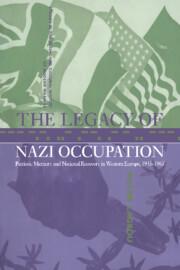Book contents
- Frontmatter
- Contents
- List of illustrations
- Acknowledgements
- List of abbreviations
- Introduction
- Part I Troublesome heroes: the post-war treatment of resistance veterans
- Part II Repatriating displaced populations from Germany
- Part III The legacy of forced economic migration
- 7 Labour and total war
- 8 Moral panic: ‘the soap, the suit and above all the Bible’
- 9 Patriotic scrutiny
- 10 ‘Deportation’: the defence of the labour conscripts
- Part IV Martyrs and other victims of Nazi persecution
- Conclusion
- Bibliography
- Index
7 - Labour and total war
Published online by Cambridge University Press: 02 December 2009
- Frontmatter
- Contents
- List of illustrations
- Acknowledgements
- List of abbreviations
- Introduction
- Part I Troublesome heroes: the post-war treatment of resistance veterans
- Part II Repatriating displaced populations from Germany
- Part III The legacy of forced economic migration
- 7 Labour and total war
- 8 Moral panic: ‘the soap, the suit and above all the Bible’
- 9 Patriotic scrutiny
- 10 ‘Deportation’: the defence of the labour conscripts
- Part IV Martyrs and other victims of Nazi persecution
- Conclusion
- Bibliography
- Index
Summary
Workers constituted the bulk of the populations displaced by Nazi Germany during the Second World War, totalling about eight million individuals. Nine out of ten Dutch DPs and three out of four Belgian DPs were employed as civilians in Germany. For France, if the annexed departments are excluded, more than half of the national DPs were workers, including one-quarter of transformed PoWs. The numbers involved made forced economic migration one of the major social facts of the second World War.
Historians examining war and social change have often attributed a determining influence to the deportation of workers to Germany. Some of them go so far as to explain much of the course of post-war social and economic history through the mobilisation of the work force of occupied countries. As part of their strategy of total war, Germany and Japan decided to spare their own populations as far as possible from hardships and social unrest, and shifted the social costs of warfare on to the populations of their conquered foreign territories. The wartime experience as Herrenvolk also spared the German and Japanese population from radicalisation in the post-war era, providing the foundations for a disciplined social climate and an unparalleled economic recovery. In the occupied countries, the brutal exploitation of the work force radicalised the masses, polarised the social and political climate and provided the raw material for the success of powerful communist parties, bringing social unrest, political instability and, in comparison with the German and Japanese miracles, disappointing economic achievements.
- Type
- Chapter
- Information
- The Legacy of Nazi OccupationPatriotic Memory and National Recovery in Western Europe, 1945–1965, pp. 131 - 143Publisher: Cambridge University PressPrint publication year: 1999

